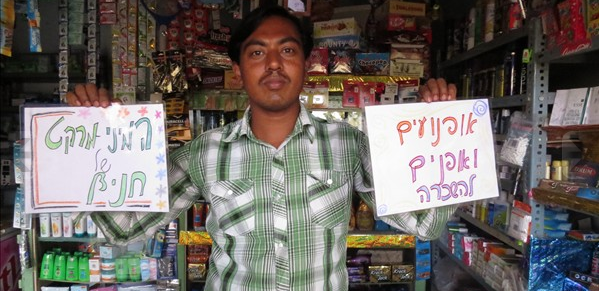[cincopa AMJAfG7vAxce]
The photographs in the above gallery were taken by staff writer Gabe Weinstein, who spent the fall semester in India.
There is still at least another hour before the moon blankets the surrounding rice fields and the gargantuan boulders here in the south Indian town of Hampi. But at Dudu Falafel it may as well be midnight. An Israeli tourist stands in the main window serenading passing strangers with the lyrics of an Israeli pop song as it blasts over the speakers. In the kitchen, Dudu Falafel owner Chandru Singh supervises his staff as they prepare falafel, shakshuka, and moussaka for Israeli backpackers and other foreign tourists. Dudu is one of several local restaurants offering Israeli comfort food – but it stands out from the rest, boasting that it imports its zaatar, paprika and even the instant coffee that many Israelis can’t live without.
“Israelis have unity. If they like the food they tell all their friends,” Singh said. “They’re like sheep, all the time together.”
Over the past decade Hampi has gone from a hot spot among Spanish and French rock climbers to south India’s Israeli backpacking mecca, said Muhammad Haneef, the owner of a local convenience store. To drum up more business among Israeli tourists, Haneef has posted Hebrew advertisements outside his store for four years, even though he has no idea what the advertisements say in Hebrew. Haneef said he averages about 30 Israeli customers a day and was preparing to replace his fading, weather-beaten advertisements with crisp, laminated replacements.
“The signs help attract customers. Ninety-nine percent of my business is from Israelis,” he said.
Every year thousands of Israelis pass through this touristy hamlet to roam the ancient ruins of a long-dead empire and take moped rides through palm-lined countrysides. Hampi was once the capital of the Vijayanagar Dynasty, which covered most of south India from the early 14th to the mid-16th century. The city’s temples, bazaars, and palaces were the envy of medieval European and Arab travelers. Muslim armies destroyed Hampi in 1565, but many temples and other structures, including bathhouses and elephant stables, survived and have been restored.
Hampi sits in the middle of a route that climbs up the subcontinent from the southern state of Tamil Nadu all the way up to the mountainous northern state of Jammu and Kashmir. Because of its popularity with Israelis, the route is sometimes jokingly referring to as the “Hummus Trail.” The reason most Israelis stop through Hampi is to lounge by the river in Hampi’s laid back tourist colony, Virupapur Gaddi, after partying on Goa’s beaches, said Libi Grumach, a local Chabad shlichah. Others begin their foray into south India here or are on their way to or from Gokarna, a beach town 190 miles to the southwest.
Local entrepreneurs have tried to cash in on the surge in Israeli tourism by adding the slightest Israeli touch to their services. Businesses ranging from laundromats to travel agencies have Hebrew signs, and internet cafes tout their cheap calling rates to Israel. Most restaurants offer at least one popular Israeli dish: shakshuka, falafel, schnitzel or Israeli salad are common.
Anil and Krishna Kumar, the owners of Hezi Tours and Travels, a travel agency and internet cafe, have turned their business relationships with Israeli customers into close friendships.
“They’re friendly. They want to be friends and be comfortable,” said the owners of Hezi’s Israeli customers.
A couple of telling decorations hang next to their desk, gifts from Israeli customers. A wooden block adorned with the Hebrew spelling of Hezi and the Hindu Om symobl hangs alongside a key-chain with the Birkat HaEsek, the Hebrew prayer for business.
“They feel the need to help us after booking bus, trains and taxis,” Anil said.
Singh, the owner of Dudu Falafel learned to make falafel while working with an Israeli at a restaurant in Goa before opening his own restaurants in Hampi and Dharamsala, a backpacker town in the northern state of Himachal Pradesh home to the Dalai Lama and the Tibetan government-in-exile . Singh speaks a bit of Hebrew and likes to play the songs of Israeli singers Meir Ariel and Mosh Ben Ari in the restaurant.
“Israelis are hard people,” he said. “But when they’re your friends, they’re kind.”

